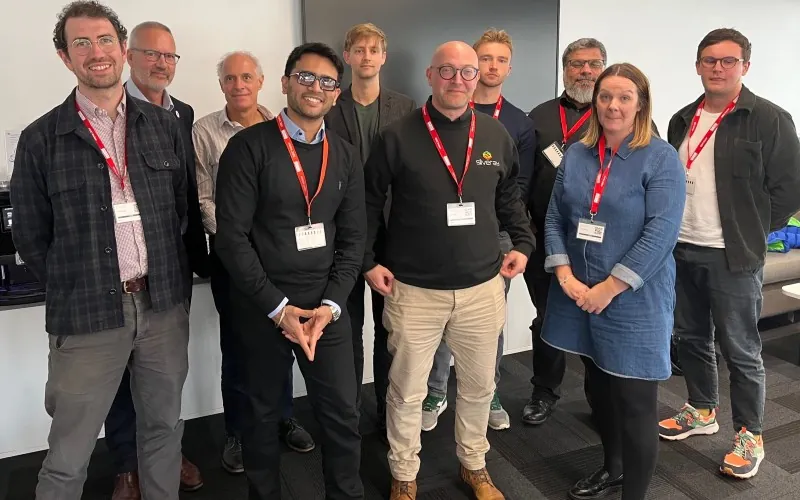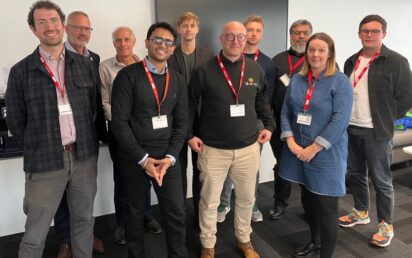Some of the rising stars of Greater Manchester’s life sciences and GreenTech sectors came together for BusinessCloud’s latest roundtable.
The discussion was the latest in a series of roundtables run in conjunction with GM Business Growth Hub following publication of the GM 125 Rising Stars of Business list earlier this year.
The list focused on four key sectors: GreenTech; digital, creative and tech; advanced manufacturing and materials; and life sciences.
The discussion was hosted by Manchester’s Graphene Engineering Innovation Centre.
Go green or go bust
PharmAppy was set up in 2020 in a bedroom in Prestatyn, North Wales, by school friends turned entrepreneurs Rhys Lloyd and Josh Ablett, and aims to improve communications between pharmacies and patients.
Lloyd said: “What I’ve taken from today relates back to what my old accountant’s slogan used to be. That was ‘companies are either born green, going green or going bust’. It doesn’t matter whether you start out as a GreenTech business, at some point in that business lifecycle you’ve got to think about society and the affect that you’re business has on it.”
We need more solar panels
Seb Leaper is the co-founder of Watercycle Technologies, which is a spin-out from The University of Manchester.
He said: “If Manchester wants to hit net zero by 2038 we should be looking out and basically seeing solar panels on pretty much every roof top. We’re not anywhere close to that. We need batteries to store power when it’s too sunny. There’s a huge amount that needs to be done and we need more joined up efforts. We need to work with finance providers to take a slightly longer term view so that payback period is accounted for.”
Joined up thinking
James Baker is the CEO of Graphene@Manchester at the Graphene Engineering Innovation Centre (GEIC), which helps companies develop and launch new technologies, products and processes that exploit graphene.
He said: “There are great businesses and great technologies. What’s nice to hear is how many of them come out of the university sector. How do we scale? If we always do what we always did, we’ll always get what we always got. For me the challenge is how do we things more joined up and more connected?”
Be part of the solution
Martin Fergie is the CEO of Spotlight Pathology, which develops decision support tools powered by artificial intelligence (AI) to help in the diagnosis of blood cancers.
He said: “As a business in the healthcare space, although you might not think you’re directly in a GreenTech company or working towards net zero, I think it’s really important to think about how your products do contribute towards that when you think about patient outcomes and improved health. Ultimately that’s going to become important to your customers in the future.”
Be careful of labels
Founded in 2018, FOTENIX has been described as the ‘FitBit for farming’ and uses technology to boost food production.
CEO Charles Veys said: “There’s some exciting stuff happening in Manchester. I don’t think GreenTech being labelled as an industry adds much value. All companies that want to exist in the next few years are going to have a green focus and green drivers. Worrying about what our label is probably not important, it’s what our common aim is and what our common location is and how be can benefit together.”
Greenwashing has changed mindsets
Dan Cathie is the co-founder and CEO at Silveray, which is on a mission to develop affordable large-area direct conversion detectors for the X-ray imaging market.
He said: “It’s pretty clear from this room that every founder or CEO here, and most likely in Greater Manchester running companies, has the best interests of society at heart, including sustainable improvements and GreenTech. It doesn’t mean they see that as the core selling point of their business but everyone is trying to build that in. Fundamentally making money is why the businesses are created. What greenwashing, let’s call it, has done is it’s forced it into people’s mindsets.”
Media needs to be fairer
Vicky Wilding manages a team of advisors, delivering award-winning sector support for the Green Economy team.
She said: “I would echo everything that Seb talked about. We need to address the market failure in the uptake of green technologies, products and services. There’s definitely some confusion in businesses acting sustainably and businesses operating in the GreenTech and services space.”
“There are lots of negative press around things like heat pumps and how they work but we don’t see the flipside of that and the positive stories.”
Manchester is changing
Yousef Taktak is a health and life sciences specialist at the Growth Company and said: “Greater Manchester is very rich in life science and GreenTech businesses. I’ve seen the change over the years where we’re now into digital health and more focused on diagnostic.”
We need a new label
Sid Sethi is the founder and MD of Bury-based Specscart – one of the UK’s fastest growing eyewear businesses. Sethi launched the business in 2018 with a focus on fashionable and low-priced eyewear.
Sethi said: “I completely agree with Dan’s point. All the founders and CEOs have the best intentions at heart to create sustainability. What I’d love to see is a new title that we could potentially label good businesses with, just like the Good Employment Charter. It could be the Good Green Business Charter so we could have a new label for Manchester’s businesses.”
Don’t think of waste as waste
Ethar Alali is the CEO and founder of ReallyRecycle.com and Automedi, which is a groundbreaking recycling business that transforms plastic waste into products using 3D print vending machines.
He said: “Every company has to think of themselves as a GreenTech company. It’s not just about changing the amount of recycling we do, it’s also how we can stop thinking of waste as waste.”


